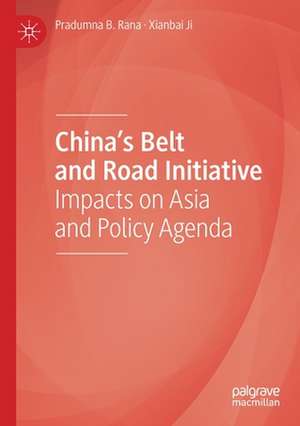China’s Belt and Road Initiative: Impacts on Asia and Policy Agenda
Autor Pradumna B. Rana, Xianbai Jien Limba Engleză Paperback – aug 2021
| Toate formatele și edițiile | Preț | Express |
|---|---|---|
| Paperback (1) | 448.58 lei 6-8 săpt. | |
| Springer Nature Singapore – aug 2021 | 448.58 lei 6-8 săpt. | |
| Hardback (1) | 454.92 lei 6-8 săpt. | |
| Springer Nature Singapore – 31 iul 2020 | 454.92 lei 6-8 săpt. |
Preț: 448.58 lei
Nou
Puncte Express: 673
Preț estimativ în valută:
85.84€ • 93.53$ • 72.33£
85.84€ • 93.53$ • 72.33£
Carte tipărită la comandă
Livrare economică 23 aprilie-07 mai
Preluare comenzi: 021 569.72.76
Specificații
ISBN-13: 9789811551734
ISBN-10: 9811551731
Pagini: 186
Ilustrații: XX, 186 p. 28 illus.
Dimensiuni: 148 x 210 mm
Greutate: 0.28 kg
Ediția:1st ed. 2020
Editura: Springer Nature Singapore
Colecția Palgrave Macmillan
Locul publicării:Singapore, Singapore
ISBN-10: 9811551731
Pagini: 186
Ilustrații: XX, 186 p. 28 illus.
Dimensiuni: 148 x 210 mm
Greutate: 0.28 kg
Ediția:1st ed. 2020
Editura: Springer Nature Singapore
Colecția Palgrave Macmillan
Locul publicării:Singapore, Singapore
Cuprins
Chapter One: China’s Belt and Road Initiative: Introduction and Overview.- Chapter Two: Proliferating Major Power Infrastructure Initiatives.- Chapter Three: Potential Economic Impact of BRI: A CGE Analysis.- Chapter Four: Perception Survey of Asian Opinion Leaders.- Chapter Five: BRI and Southeast Asia.- Chapter Six: BRI and South Asia.- Chapter Seven: BRI and Central Asia.- Chapter Eight: Policy Recommendations.
Notă biografică
Dr Pradumna B. Rana is Associate Professor at the Centre for Multilateralism Studies of the S. Rajaratnam School of International Studies, Nanyang Technological University, Singapore. He was previously the Senior Director of the Asian Development Bank’s Office of Regional Economic Integration which spearheaded the ADB’s support for Asian economic integration. He obtained his PhD from Vanderbilt University,USA, where he was a Fulbright Scholar and a Masters in Economics from Michigan State University, USA, and Tribhuvan University, Nepal (Gold Medalist).
Dr Xianbai Ji is a Research Fellow with the International Political Economy programme at S. Rajaratnam School of International Studies (RSIS), Nanyang Technological University, Singapore. He obtained his PhD from RSIS, Singapore, as a Nanyang President’s Scholar.
Textul de pe ultima copertă
The Belt and Road Initiative (BRI), officially unveiled in 2013, is Chinese President Xi Jinping’s signature foreign and economic policy initiative to achieve improved connectivity, regional cooperation, and economic development on a trans-continental scale. This book reviews the evolving BRI vision and offers a benefit-risk assessment of the BRI’s economic and geopolitical implications from the perspective of Asian stakeholder countries, using both qualitative and quantitative research methods. Among the value added of the book is first an online perception survey of opinion leaders from Asian participating countries on various aspects of the initiative. To our best knowledge, the survey is the first of its kind. Second, the book presents the simulation results of a computable general equilibrium model of the world economy to estimate the potential macroeconomic impacts of the BRI as a whole and those of its constituent overland and maritime economic corridors. Third, the book makes ten key evidence-based policy recommendations on how to enhance the prospect of a successful and mutually beneficial BRI 2.0 to both China and stakeholder countries.
Caracteristici
Reviews the evolving BRI vision and explores the economic and geopolitical implications of the BRI Provides simulation results of a computational general equilibrium model of the world economy to estimate the macroeconomic impacts of the BRI Presents the results of an Asia-wide online perception survey of opinion leaders, the first ever attempt to do so Offers a benefit-risk assessment of China’s initiatives on various Asian regions, East Asia, South Asia and Central Asia Provides policy recommendations to improve the BRI on the basis of research-based, model-based and perception-based findings
